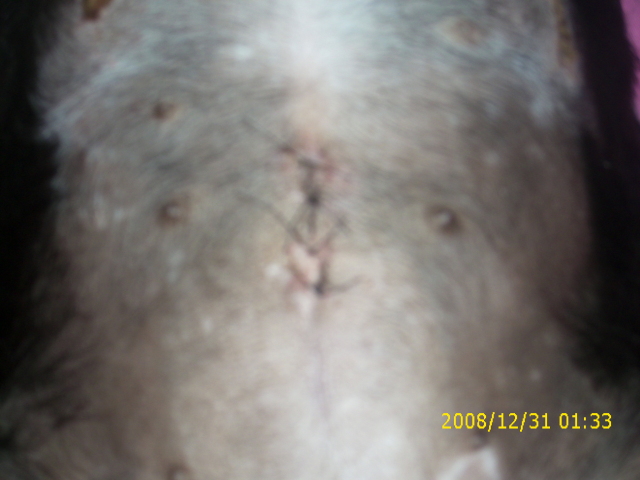QuestionOK...here are the facts: AKC Dalmatian 6 years old, not as eager with his food lately, increased thirst, decreased heart rate, occasional coughing, no neurological or personality changes. We took him to the vet today...they did bloodwork, x-rays, urinalysis, EKG - he is negative for heartworm & diabetes, positive for significant heart murmur, enlarged heart on right side, and PVCs. The vet said she thought it was a brain tumor (no way to confirm without an MRI) because of the brain not telling the heart what to do. She consulted 2 other docs and they thought of hypothyroidism. She sent us home with Pyroxine <can hardly read her writing> .3mg, we are to give him 1/2 at 6 am tomorrow and take him in at 12:15pm to make sure he is not having a reaction and also find out results from other bloodwork. I have researched brain tumors in dogs and he is not matching any of the symptoms, a link : http://www.marvistavet.com/html/body_hypothyroidism.html suggested that 26% of hypothyroid dogs experience decreased heart rate.
I wonder if he has just one or multiple things going on - hypothyroidism or brain tumor, or a heart (mitral valve) issue, or more.
Any help or direction would be greatly appreciated.
AnswerHi Renee,
Dalmatians are one of the breeds prone to Hypothyroidism, so it's worth going back to your vet so additional tests can be run.
Hypothyroidism is not always a simple, straightforward disease to diagnose. Various tests are available to diagnose the condition and a combination of tests may be required. Proper diagnosis also includes a thorough history, documentation of clinical signs, a thorough physical examination, and diagnostic tests to assess various organ functions, including thyroid function. A diagnostic work-up may include the following:
Complete blood count (CBC)
Biochemical profile
Urinalysis
Thyroxine (T4) level, free-T4 level
Canine TSH test
Fortunately, hypothyroidism is easily treated and involves the administration of daily doses of synthetic thyroxine. Once treatment is started, it usually must be continued for the rest of the dog's life.
The medication, Pyroxine (or Pyridoxine) is also known as vitamin B-6. Signs of a deficiency are weight loss, dermatitis, hair loss, and anemia. Excess amounts is not considered to be toxic. I have no idea why it was prescribed, I'm not a doctor after all. Is it possible that you misread the label?
Symptoms alone are not enough to positively diagnose a brain tumor. Many symptoms can be caused by other diseases, so you'll want to rule those out to make sure you dog receives the appropriate treatment.
If your veterinarian suspects your dog has a brain tumor, but is not sure, the best thing to do is to make an appointment for a consultation with a veterinary neurologist. You can probably find one at your state college of veterinary medicine. Large clinics in major cities might also have one on staff. A veterinary neurologist is likely to have experience with canine brain tumors and access to the tools needed to diagnose and treat the disease.
Dogs often compensate well for years, despite a heart murmur. Over time however, changes will occur in your dog's heart because of the increased work to make up for the insufficient, or leaky, mitral valve. Early signs that the heart is no longer able to compensate for mitral valve disease may include a reduced tolerance for exercise, difficulties in breathing, or a cough at night or at rest, and enlargement of the LEFT side of the heart. All of these occur because of a build-up of fluid in the lungs.
Your veterinarian may want to do radiographs and possibly an electrocardiogram to further assess the condition.
I wish I could have been more of a help. I guess you can begin by ruling out the easy stuff, such as a Thyroid condition and the heart murmur.
Best of luck,
Patti

 Abby
Question
Abby Abby
what breed of dog do yo
Abby
Question
Abby Abby
what breed of dog do yo
 Delayed German Shepherd Heat
QuestionMy German Shepherd
QUESTION: I have a Ge
Delayed German Shepherd Heat
QuestionMy German Shepherd
QUESTION: I have a Ge
 my older dog is house broken but not
QuestionQUESTION: I got a 9 yr old dog from a shelter a
my older dog is house broken but not
QuestionQUESTION: I got a 9 yr old dog from a shelter a
 I want to know how to remove my dogs spay stitches and the right way.
Question
this is the area that
I need to know how to r
I want to know how to remove my dogs spay stitches and the right way.
Question
this is the area that
I need to know how to r
 dog who growls and nips
Question
Ladybug
We adopted a rescue dog, Ladybu
dog who growls and nips
Question
Ladybug
We adopted a rescue dog, Ladybu